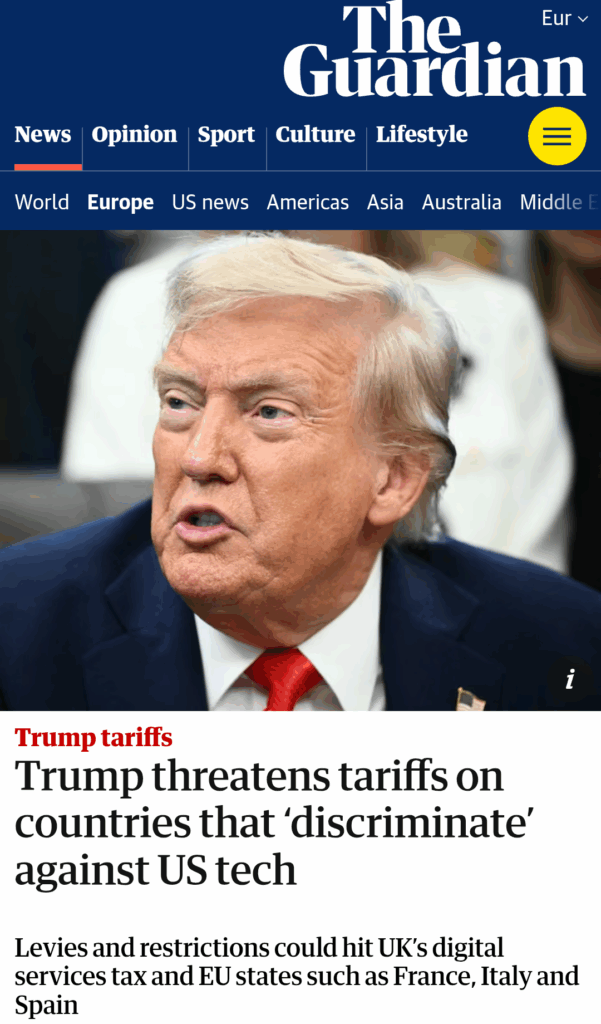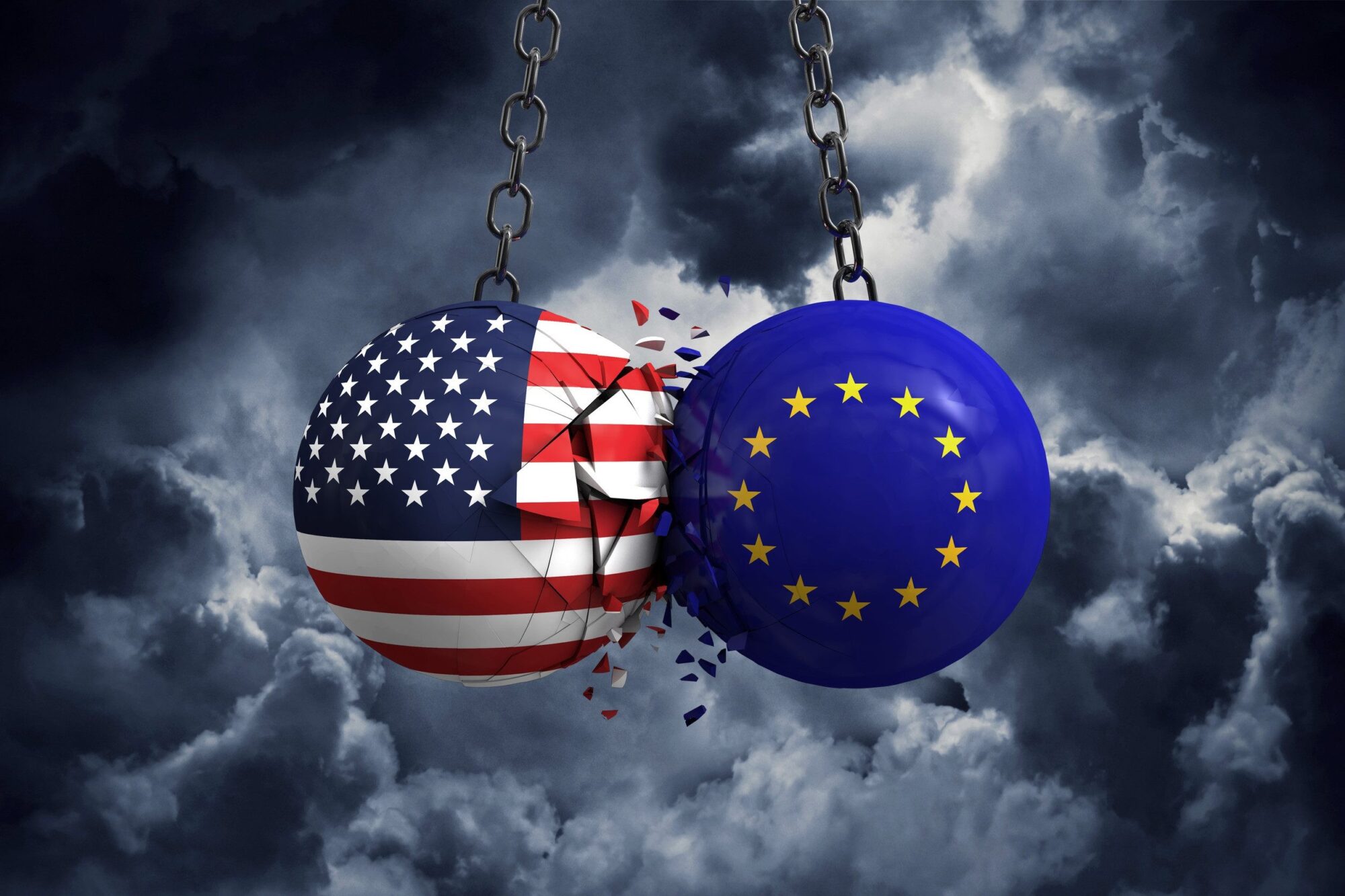While the world is speeding towards the next iteration in digital with genAI, the current political climate & massive geopolitical change leading to a new multi-lateral world is introducing a counter iteration against reliability & dependency. Although decentralization in technology has been a topic for almost a decade after innovations such as blockchain, the 2nd term of American president Donald J. Trump together with the war in Ukraine has Europe deeply thinking of its dependency on Big Tech in the United States of America. German government moving away from a stable Microsoft environment to open source Linux is the boldest switch to date. Too bold, I hear you say? A very necessary one if you look at the fact that the FTC is dictating to agencies how to change internal policies of free speech to sacrifice brand safety in order for OMG & IPG to merge.

I do want to emphasize that this is not a new phenomenon, but rather an extension of quite some existing trends in the past decade:
- Increased EU legislation with GDPR, ePrivacy, DSA & DMA
- The rise of decentralized technology in the tech industry
- The success of overall industry framework support like openRTB & TCF
- The cookieless (r)evolution
These are all examples of trends trying to make an open & more safer internet for European citizens. But the question still remains: What does this mean for me as a business? How can a company or organization decrease its footprint in US platform, media, martech & adtech without losing competitiveness? Where to start looking for local alternatives and how to avoid European protectionism?
In this article, we will try to help you to start taking the first steps to more independency towards Big Tech in general. We will introduce a process to map out where you can start your journey towards data sovereignty in digital media with your company & organization.
Mapping
Let’s start with the foundation. Start at the core and map out your current tech stack to indicate where you as an organization/company are dependent or independent. European-Alternatives.eu might already be a good start for you to find alternatives to part of your tech stack. But your motivation shouldn’t soly be political, because that might lead to a lack of innovation & loss in competitiveness. It should be about data ownership and freedom to measure, track, target & buy the way you want to as a business.
This mapping shouldn’t necessarily be done alone within the organization. There are loads of consultancy firms, agencies or independent specialists of all sorts that can guide you with this process, but do try to do the work necessary for you to make your own independent decisions as an organization.
EU & decentralized tech
During the exercise, the first challenge you will encounter is finding the origine of your vendors, because we have been and still are living in a globalized society for decades. Can we really say that an Oracle, Salesforce, Microsoft, Google, Adobe is truly American? However, the core of the exercise is not to put flags on your different components within your digital marketing stack, but rather your dependency on it. If this tool starts to malfunction or the service is stopped in your region, how easy is it for you to switch to another solution with the resources you have at your disposal. How much are your tech vendors locking you into their ecosystem? Do I have access to the data I have generated and can I migrate this to another solution? Do I have the infrastructure to store my data independently for my organization/company?
That doesn’t necessarily mean your always have to go for pure European players, although in terms of legislation this is more advised. It’s also an idea to support global decentralized solutions coming from the international markets themselves, because also in the US, people want to become less dependent upon big tech oligarchs. Initiatives like Signal, BlueSky & Mastodon in social media are the perfect examples, because you support frameworks like AT Protocol or ActivityPub that are open source and provide data towards a protocol that is not owned by anyone & stored locally. Another example in martech specifically is SOLID by Sir Tim Berners-Lee, the original founder of the World Wide Web. So if during your exercise, you want to go beyond nationality, it would be advised to look into decentralized tech & open source initiatives.
Privacy by design
If there is one thing most of the companies & organizations understand when generating data from digital campaigns online, it’s the privacy issues that arise when using Big Tech. Previously, it was already a serious discussion with the rise of Chinese Big Tech like AliExpress from Alibaba, Tiktok from ByteDance, WeChat from Tencent or Temu from PPD Holdings who have to give the government access to data whether they want to or not. However the more the United States of America starts moving to the authoritarian right-side, the same questions can be asked about the GAFAM (Google, Amazon, Meta, Apple, Microsoft) who need to provide access to the FBI, CIA, NSAs of this world with their immense access to all sorts of local and global data. Personalized data, that you as a local organization or European company have generated for your customers, you are responsible for. So doing a risk assessment of your current digital marketing footprint is not just a interesting exercise to do, it’s a must for any organization / company nowadays. Ask yourself the following and look for alternatives:

Result
As a result of your mapping & privacy by design, you should be able to make decisions more freely as a business. Look into European initiatives, support local businesses, go where your audiences are and not be blinded by innovation or hold up by technology.
CASE
During my career with Adform, we have been given the privilege to work with strong European brands such as Ikea & BMW who has done this exercise long before it actually became an issue as described above. And it’s clear that they both benefited from an agnostic European technology platform to distribute digital marketing campaigns evenly across the board. Whether their goal was to reduce carbon emissions to reach ESG goals or going hyper-personalized in their digital marketing approach, supporting a healthy and local ecosystem was always central to their media planning & buying. A European tool such as Adform gives them the means to do this in a professional & thoughtful manner supported by their agency partners who also long for (data) freedom & sovereignty for their clients.
WHAT WILL THE FUTURE BRING?
Although a lot of people can’t see past uncertainties that are currently arising in the industry, we due think the future of AdTech is bright. The tendency for publishers to create their own ecosystems due to privacy concerns and on the back of Big Tech created walled gardens is counter-parted by the introduction of Retail Media where retailers are setting up their own ecosystems for brands within stores. Although retail media networks still need to mature as an evolution within Trade Marketing, we believe that eventually because of the widespread adoption by large numbers of retailers, there will be a tendency to centralize again like was the case in 2010 with the introduction of real-time bidding within programmatic marketing. And the evolution of onboarding more & more omnichannel inventory getting introduced into programmatic marketing such as connected TV, Digital Out-of-Home, streaming audio & VR, won’t stop either. We can’t conclude the future with touching upon genAI who will have a place in this industry to increase productivity for buyers & sellers who are being challenged by the never-ending complexity of Digital. Especially with new generations of audiences like Gen Z & Gen Alpha who will become increasingly privacy concerned and move away from the 3rd party cookie or mobile advertising ID.

By Dax Vercauteren
20 years experienced media-professional with a specialization in AdTech, adserving, tracking & programmatic marketing. Digital movie journalist & co-founder of MoviePulp.be
